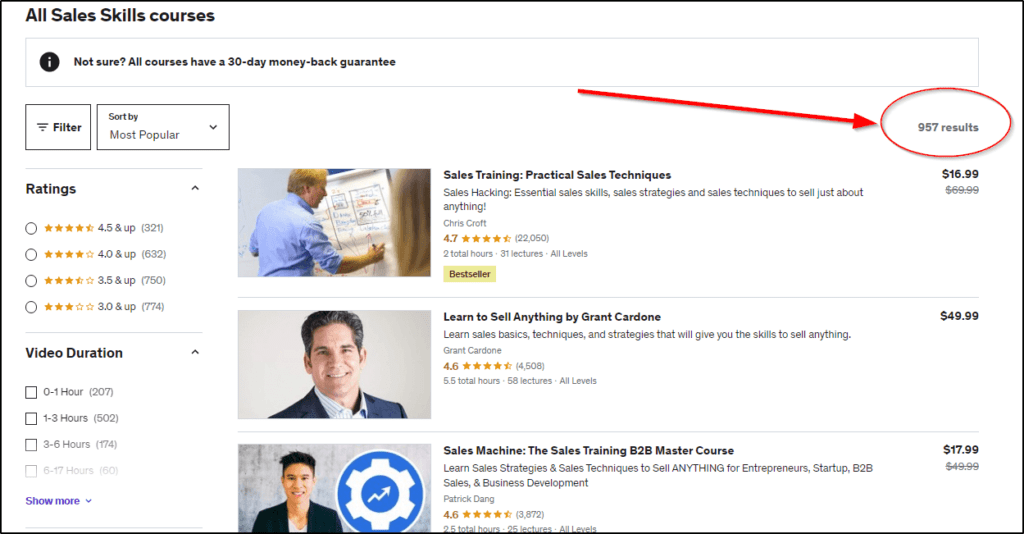

Udemy is the first choice for most beginner online course sellers because of its ease of use, massive market size, and millions of monthly visitors.
But if you’re looking for new marketplace platforms to teach online, expand your reach, and sell more online courses, there are several Udemy alternatives with equally impressive course creation and marketing features.
In this article, I’ll discuss a dozen alternatives to Udemy, along with their pros and cons, to help you to decide if they’re the right choice for selling your online course.
Let’s dive in.
This article is for people who want to create and sell online courses on Udemy. Interested in alternatives to Udemy for taking online courses? See this article on 17 Udemy Alternatives To Learn New Skills With Online Courses.
What Is Udemy?


Udemy is among the world’s most popular online learning marketplace platforms, where 70K+ eLearning professionals have sold over 200K online courses to more than 59 million students worldwide since 2010.
It is an ideal place for beginner online course sellers to monetize their knowledge and share their expertise with the world. It allows you to focus on content creation while it takes care of your course marketing, student management, and all the technical aspects of hosting online courses.
In addition, Udemy’s biggest strengths are its large pool of returning customers and massive investments in SEO and advertising campaigns that drive millions of monthly visitors to its platform. This means that you don’t have to worry about finding customers as long as you create valuable courses that answer your audience’s questions.
While you can create a Udemy course on any topic, its most popular categories are technology, programming, SEO, content writing, web/graphic design, and media skills like videography, photography, and editing.
Why Look For Udemy Alternatives?
If Udemy is so good, why look for alternatives? Fair question.
Firstly, we all like choices. So, with the right Udemy alternatives, you’ll never have to rely on one platform for all your income.
But there are other important reasons to look for alternatives to Udemy. For example, there’s a lot more competition between sellers on Udemy than many of its alternatives. So, while Udemy gets a lot of traffic, the increased competition means getting students for your courses is challenging.
For instance, Udemy has nearly one thousand courses in the Sales category alone.


In addition, Udemy takes a pretty big cut from your course sales (63%, to be precise), making it less than ideal for course sellers. You do, however, keep 97% of your sales revenue if the students use your coupons or referral links.
Another reason to look for Udemy alternatives is that it is a generic platform where courses on all kinds of topics are available. Switching to an industry-specific platform would help you sell courses for a higher rate and earn more money.
And finally, why shouldn’t you look for Udemy alternatives when you can list the same course on multiple platforms and 10x your income?
Quick Verdict | The Best Alternatives To Udemy For Online Course Sellers
Quickly want to know the best Udemy alternatives? Here’s my finalized list.
- Teachable – Best for building an online course brand
- Skillshare – Best overall Udemy alternative
- Domestika – Best Udemy alternative for creative professionals
- Udacity – Best Udemy alternative for experienced tech professionals
These are my choices, but there are many other excellent platforms on this list. So, do read about them to find out if they’re the right fit for your needs.
Online Course Marketplaces vs. Online Course Platforms – The Key Differences
When looking for alternatives to Udemy, you’ll come across two kinds of online course platforms – marketplaces and dedicated course tools.
What’s the difference?
Online course marketplaces, like Udemy, provide sellers with a platform to upload and sell their online courses without worrying about hosting, student management, or marketing. They invest hundreds of thousands of dollars in advertising, SEO, and other promotional methods to drive traffic to their platform, where thousands of courses are listed in different categories.
So, for example, if you sell a course about SEO on an online course marketplace, it’ll appear alongside hundreds of courses when prospects search for your topic. The higher your course appears in the search listings, the more students it attracts.


In other words, you’ll compete against hundreds of other courses, and your only points of difference will be your rankings and positive reviews.
Dedicated online course platforms, like Teachable and Thinkific, are slightly different types of Udemy alternatives. They’re not marketplaces with thousands of courses in different categories. Plus, they don’t market your courses or perform any promotional activities to attract students.
Instead, they provide you with world-class online course creation and student management features, allowing you to quickly create an online school to list and sell your courses on your website or a dedicated domain.


Such platforms offer superior course creation features and are ideal for established brands or course sellers who can attract students by investing in SEO, email marketing, and advertising.
Both marketplaces and online course platforms are possible alternatives to Udemy, depending on your business goals.
The Best Udemy Competitors And Alternatives For Online Course Sellers
Let’s now dive right into the different Udemy alternatives for selling online courses and growing your eLearning business.
Udemy Alternative #1: Teachable
Teachable is among the top online course platforms, allowing professionals and hobbyists to monetize their expertise by selling highly engaging online courses.
It is an excellent Udemy alternative despite being drastically different.
Udemy vs Teachable
Wondering about Teachable vs. Udemy? Check out our full comparison.
Teachable gives you a dedicated online course platform with advanced student management, course branding, content creation, and marketing features. It comes with a website/landing page builder, quizzes, and multimedia content creator. You can host a Teachable school on your website, a dedicated domain, or a Teachable subdomain.
Many online course sellers use Teachable with Udemy to grow their audience.
It only charges you a monthly fee for using its platform and a transaction fee on every sale. But you keep the rest of the revenue yourself.
However, unlike Udemy or any other online course marketplace, Teachable doesn’t market your courses. So you must either have an email list, a blog, or an advertising budget to drive traffic to your courses.
Here’s how.
They build their main high-ticket courses on their Teachable website and publish low-ticket or free courses on Udemy to gain exposure. Once a student signs-up for their limited-scope course, they route them to the main Teachable website for the full course.
In other words, they use Udemy courses as tripwires for their high-ticket training programs on Teachable.
Who should use Teachable as a Udemy alternative? Established course creators and marketers who can drive traffic to their courses. For beginners with limited marketing knowledge, Udemy is still the better option.
Udemy Alternative #2: Domestika


Domestika is an online course marketplace for creative professionals like musicians, artists, designers, photographers, illustrators, and writers.
Like Udemy, Domestika is also a marketplace platform where multiple courses are publicly listed in different categories. However, the content and production quality of Domestika’s courses is much higher.
Because, unlike Udemy, Domestika doesn’t give creators a free hand to create courses on any topic. Instead, you must pitch your idea first, refine it with Domestika’s team, and start creating content after approval.
Plus, Domestika stays involved throughout the course production process, films the video content in one of its many in-house facilities across the globe, and helps you create the most valuable course for its audience. If you must fly to one of its studios, Domestika even covers your travel expenses. This is why you’d rarely find low-quality or rehashed courses on Domestika.
How do you get paid as a course seller on Domestika?
They pay you an advanced fee during the course creation phase. Then, once your course is listed on the platform and starts getting students, you earn a royalty on every sale after adjusting the advance amount.
Who should use Domestika as a Udemy alternative? Experienced creative professionals with a proven record of selling online courses.
For beginners, Udemy is still the better option.
Teach On Domestika Now
Udemy Alternative #3: Skillshare


Seeking a Udemy alternative? Skillshare is the perfect replacement. Like Udemy, Skillshare is an online course marketplace with thousands of courses in dozens of different categories like technology, programming, designing, personal development, business, lifestyle, communication, and creative arts.
It allows you to create multimedia courses in your areas of expertise and upload them to the Skillshare marketplace, where thousands of students actively search for new courses.
Your earnings as a Skillshare instructor depend on the number of minutes students watch your content every month. There’s no fixed commission rate or formula to predict your earning since Skillshare considers multiple factors like content engagement and whether the viewer is a free trial user or a paid subscriber.
However, according to Skillshare, you can expect to earn 5 to 10 cents every minute a subscriber watches your course content.
Sell Courses On Skillshare
Udemy Alternative #4: LinkedIn Learning with Lynda


LinkedIn acquired Lynda in 2017 to establish LinkedIn Learning, a dedicated online learning platform similar to Udemy and Skillshare.
It contains thousands of online courses on programming, project management, coding, copywriting, business communication, and many other professional skills.
Unlike Udemy, LI learning is uniquely positioned because of its deep integration with LinkedIn. LinkedIn recommends your courses to relevant professionals on their timelines and profile pages resulting in higher conversions.
However, it isn’t as friendly to beginner course sellers as Udemy. Instead, you must be an experienced professional with excellent communication skills and a persuasive course idea to get approved by LI Learning’s content team.
Once approved, LI Learning takes over the course production process and even flies you to one of its recording facilities if needed.
As a LinkedIn Learning course seller, you’re paid for the amount of time students watch your content (similar to Skillshare). So, the longer a student sticks to your course, the more you earn.
Sell Courses On LinkedIn Learning
Udemy Alternative #5: Maven


Maven is an online course marketplace for live cohort courses where student groups enroll in a course and complete it together in a fixed time period.
It is an excellent platform for skilled professionals to share their knowledge, grow their income, and impact their students’ lives.
Since all courses on Maven are live, they’re much more engaging than recorded programs. In addition, they’re priced much higher than the courses on other marketplaces like Udemy or Skillshare. For example, this HR course costs $2000 per student.


Maven’s target audience is professionals looking to enhance their programming, product development, engineering, communication, and business skills. This is why they carefully choose their instructors and do not approve courses without thorough examination.
So, it’s not an ideal platform for beginners.
But if you’re a professional with a proven track record of delivering knowledge to your students, you can earn up to $30K for every cohort-based course once it goes live.
Teach On Maven
Udemy Alternative #6: Coggno


Coggno is a multipurpose eLearning platform that allows skilled professionals to sell online courses on its marketplace or a dedicated branded online school powered by Coggno.
It is an excellent Udemy alternative because of its low course prices and wide range of course categories. It currently has over 10,000 online courses in categories like project management, HR, workplace safety, accounting, health, productivity, and technology.
To sell courses on the Coggno marketplace, you must be an expert in your topic and abide by the platform’s policies. Once your course is approved and listed, you earn a percentage of your course price on every sale, the same model Udemy uses. However, Coggno keeps a much smaller cut from your earnings than Udemy, making it an attractive option for sellers.
Sell Courses On Coggno
Udemy Alternative #7: Alison


Alison is among the world’s most extensive online course libraries, with thousands of courses and millions of monthly active learners across the globe.
It allows experts and skilled professionals to monetize their knowledge by creating comprehensive online courses and selling them on the Alison marketplace.
Most courses on Alison are free, so you don’t make money on course sales as a creator.
Instead, Alison makes money from advertising and pays its creators based on the time students spend on their courses. So, the more courses you upload on Aliso, the more time students will collectively spend on your content.
Who can become an Alison course seller? Anyone with a professional background in the topic they want to teach. Plus, instructors must apply to Alison’s publisher program and complete its course creation training before publishing their first course.
Overall, it’s a pretty good alternative to Udemy because of its traffic volume and reputation.
Sell Courses On Alison
Udemy Alternative #8: Edureka


Edureka is a dedicated platform for online courses in information technology, digital marketing, and eCommerce. It allows IT professionals and online business experts to sell co-created courses on well-defined tech subjects.
Edureka stands out for its relentless focus on course completion rates. Once a student signs up for an Edureka course, their 24×7 support team uses various follow-up methods to resolve any problems, remove bottlenecks, and ensure the students complete the course.
You can sign up as an Edureka course seller if you’re an academic or a professional in a relevant technology area. However, you must go through their seller approval process and complete their course creation training program before you can publish your first course.
Sell Courses On Edureka
Udemy Alternative #9: OpenSesame


OpenSesame is an online course marketplace designed for businesses, agencies, and professional organizations looking to improve their employee skill set.
It lists hundreds of courses about technology, HR, productivity, communication, marketing, and other categories.
OpenSesame is among the few online course platforms that support SCORM (Sharable Content Object Reference Model) courses. This allows OpenSesame users to easily integrate its courses with their in-house LMS and quickly set up educational programs for their employees.
To sell courses on OpenSesame, you must be an experienced trainer with a proven record of delivering high-quality online courses. Once your courses are approved and listed on OpenSesame’s marketplace, you get paid every time a customer purchases your course or integrates it with their LMS.
However, the exact details of OpenSesame’s revenue-sharing model are not publicly available.
Sell Courses On OpenSesame
Udemy Alternative #10: Outschool


Outschool is designed to help school children learn different subjects and life skills via live online classes. It is a marketplace where teachers, academics, and professionals offer one-off classes and live courses on math, science, arts, languages, coding & tech, and communication skills.
You don’t need to be a professionally certified teacher to offer classes in Outschool. Instead, if you can prove your proficiency in a subject and meet the platform’s minimum content standards, you’re good to go.
Unlike other platforms on this list, Outschool only offers live coaching, classes, and cohort courses. So, it’s not the perfect Udemy alternative since you need to be actively involved with your students all the time.
Still, it’s a good option to consider if you want to earn by teaching online.
Teach On Outschool
Udemy Alternative #11: Skillup by Simplilearn


Skillup is an online course marketplace offering programs, certifications, and courses in information technology, coding, network security, digital marketing, and business skills.
It is owned by Simplelearn, another tech-focused eLearning platform, containing hundreds of world-class courses taught by professionals with years of hands-on experience.
If you’re a coder, programmer, project manager, or related to other tech skills and want to make money by selling online courses, Skillup is an ideal platform.
To sign up as a seller, you must have relevant professional and academic qualifications in your field. In addition, you need to go through the application process, which includes training on creating an effective online course.
In short, Skillup isn’t the most beginner-friendly platform for sellers. But if you’ve been selling tech courses on Udemy for a while, Skillup is definitely worth checking out.
Sell Courses On Skillup
Udemy Alternative #12: Udacity


Udacity is among the top eLearning platforms for tech skills like programming, data science, artificial intelligence, cloud computing, product management, and other related topics.
It offers hundreds of world-class courses taught by industry leaders and professionals with years of experience in the tech industry.
To become a Udacity instructor, you must have at least 5 years of professional experience in your industry, plus a track record of delivering online training.
Unlike Udemy, Udacity doesn’t pay per sale. Instead, it contracts its instructors to create courses on different topics and pays an agreed hourly rate.
To ensure content quality, Udacity’s production team controls the course creation process by helping you finalize your topic, course outline, and content. In addition, they may even fly you to their in-house studios for video recordings of your course.
In short, if you’re an established eLearning professional in the tech industry, Udacity offers an excellent opportunity to take the next step in your career.
Sell Courses On Udacity
Ready To Try These Udemy Alternatives?
As you’ve seen in this article, there are very few online course platforms identical to Udemy in every aspect. However, all the Udemy alternatives we’ve discussed allow you to sell online courses and make money by sharing your knowledge in various ways. So, ideally, instead of replacing Udemy with these platforms, you should use them as additional sources of income and gain more exposure for your content and online courses.
If you have questions about any specific platform, let me know in the comments.
Table of Contents





Hi, Great content. You can also consider Simpliv Learning is also best alternative to Udemy and update into your next list of alternatives.
Read more carefully – it is already in the list.
You forgot Shaw Academy. Please check out Shaw Academy for online certification courses.
Not seeing anything about how someone would actually teach (and make money) on Shaw Academy, which is what this post (and this site) is about. – Jeff
Hey Jeff, thanks for another great post! I’ve been looking for platforms to host my content to drive an increase in sales. So far I have tried the main ones, Udemy and Skillshare with mixed success. I also tried some of the newer ones like YouAccel and SkillSuccess or Skillwise. Surprisingly YouAccel delivered the best results in terms of stable monthly income and student enrolments. I probably made the most on Udemy, but after the first month my sales took a dive. I guess it’s their way of incentivizing instructors to keep adding new content.
I was wondering if you had any thoughts on which niche of courses delivers the best results. I teach mostly business related courses, specific to the food industry. It’s a tough area to break into, but it’s my main area of expertise.
Thanks again 🙂
Thanks for sharing this, Emma. I will take a closer look at YouAccel. RE: niches – I don’t think there is a one-size-fits all answer on that. In general, tech-focused topics tend to do well, probably because the audience is highly receptive and the pace of change is high (certainly two characteristics to look for in any niche). That said, you kind of have to stick with your area of expertise – or else find other experts to collaborate with. Within the food industry, I’d be looking for where things are changing fast and where regulation is going to create incentives for education/training – and (you may already be doing this) I’d probably be targeting employers over individuals. – Jeff
Hi Jeff,
Thanks for this interesting post! I read it, and headed over to Curious to put a course on to their platform, and it gave me this notice when I tried:
“Attention: Curious is not accepting new teacher content at this time.
You will continue earning money on existing content and can edit published content.
Questions? Email [email protected].”
I have emailed them to find out what’s going on.
Daniel
Thanks for letting me know about that. Will check into it to see if I can find out what is going on. – Jeff
Greetings, all! I’m curious to see if anhone has any recommendations for a need I have.
I provide online/on-demand professional development & continuing education via my library of 130 and growing courses, each 2hrs in length play/pause/resume at will.
I would like to offer a monthly subscription wherein, upon initial registration, the first course in my series is automatically added to the customer’s account, where it will remain accessible to the customer as long as their account stays active (subscription payment). Then, I’d like a new course automatically added to the subscribers account every 30 days.
Any ideas, suggestions, questions?
Thanks in advance for your help.
Clay
Hey Guys, Just adding Spayee to the list, if the security of your course content is a priority. They also offer branded mobile apps. Check them out – http://www.spayee.com
Unless I am missing something, Spayee does not provide a marketplace, which is the main point of the platforms listed here. – Jeff
Did someone forget CreativeLive and Plantoost?
CreativeLive is a great service, but unless I am missing something, they do not appear to be a place where your average subject matter expert can create and sell a course – which would mean they really aren’t an alternative to Udemy. Plantoost seems to claim to have some sort of marketplace, but I don’t see it anywhere – there doesn’t appear to be a “there” there. They may be an excellent alternative to platforms like Kajabi, Podia, Teachable, etc., but they don’t look like a good Ydemy alternative to me. – Jeff
Yeah I have heard about Plantoost. It certainly does look like a legit Udemy alternative!
Please also have a look at http://www.svsoftsolutions.com
Thanks
There are several alternative to Udemy including Free and Paid E-learning platform like Lynda, CollaberaTACT, Simplilearn, KnowledgeHut etc.. One benefit of paid training is that, you can acquired certification course from the reputed institution which can be beneficial in your career graph.
One of the things you want to consider when picking a platform is if the company is actively marketing to corporations to resell your content. I worked in a training organization and was routinely contacted by Udemy, Skillshare, and OpenSeasame. Many platforms are just that…platforms and don’t do additional selling to sell your topics.
Good point, Susan – Jeff
Hard to believe Zenler (www.zenler.com) is not on that list. If you’re a course creator, I think it’s far better than any of the alternatives you’ve mentioned. No upfront fees, you only pay if you sell. Highly recommended.
Hey Jeff,
Do you any marketplace that is targeting language learner? I noticed that Marketplaces like Udemy, Lynda are more designed for people who want to pursue IT relevant skills. I am a language teacher looking for a marketplace that could get my courses exposed to language learners, especially Chinese and Japanese people.
Thank you in advance!
Summer
Many thansk Jeff, this are indeed some great alternatives
Hello Jeff,
This is quite a great list of Udemy alternatives. I personally preferred Coursera and Edureka for affordable online courses. What do you think about it?
Rocky – I’ll take a look at Edureka. As far as Coursera goes, my understanding is that you have to work for a Coursera partner to be able to author courses on the platform – i.e., your average course entrepreneur can’t create and sell courses there (which is what this site is focused on). – Jeff
Try out Ednurture @ ednurture.com.
Thanks, I will check it out. In the meantime, here is the link for any readers here: http://ednurture.net/ – Jeff
Some great choices!
Thank you.